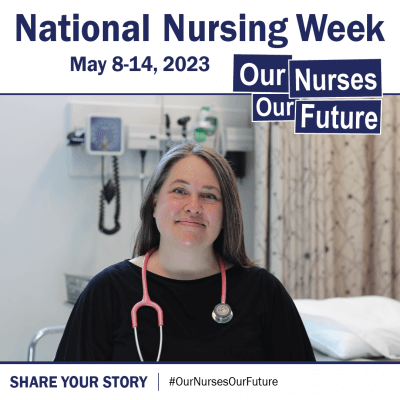By Jennifer Medlicott
For Karla Funk, nursing is a journey. It has taken her across the country and back home again. It has guided her on a path of continuous learning that began with a love of math and science, led to a bachelor of nursing degree, and has concluded with a master’s degree in nursing and a career as a nurse practitioner in rural Manitoba.
“I spent my first few years nursing in New Brunswick, working in a variety of acute care settings and getting a feel for different areas and roles,” Funk said. “It was valuable experience, but ultimately I knew I was meant to return home, and I’m so glad I did.”
After returning to Manitoba, a conversation in the right place at the right time with the right person (a friend’s mother, also a nurse) inspired Funk to continue her education.
“Training to become a chronic disease nurse has really helped shape the kind of care provider I am today,” Funk said. “It showed me that we are nurses to both a patient’s body and their mind.”
The role of a chronic disease nurse centres on the care for individuals diagnosed with a chronic illness, such as heart disease or diabetes. This includes treatment, education and preventive care while also supporting patients as they navigate the reaction and emotions of a chronic disease diagnosis.
“There are several reactions and phases that people go through when they are diagnosed,” Funk explained. “As you can imagine, there is grief, fear, denial, action or extreme action and many more, depending on the person. While chronic disease nurses care for the physical health needs of a patient, we also play an important role in each of these phases after diagnosis.”
Funk credits the 12 years she spent working as a chronic disease nurse in Southern Health–Santé Sud for preparing her to tackle yet another educational milestone as she pursued a master’s degree in nursing part-time, studying in the evenings and weekends over a four-year span.
“I am still using a lot of the skills I learned working as a chronic disease nurse now in my role as nurse practitioner,” said Funk, who graduated and began working as a nurse practitioner last fall.
Together with a team, Funk is working to provide patients with quality and comprehensive care.
“Each member of the team brings expertise from our different backgrounds,” Funk said. “My colleagues come from specialized areas such as labour and delivery, rash or skin issues, and emergency medicine, and we work together to ensure our patients receive the best care possible. We are a very collaborative group, with a lot of consults amongst the team.”
In her role at a rural Quick Care Clinic, Funk continues to see a number of chronic disease patients, including many who may not have a family care provider — checking blood work, looking at ultrasound results and doing follow-ups, while also providing more episodic care for people with more minor complaints like sore throats and rashes.
“No two days are the same, even in a small community,” she added. “The most rewarding parts of my job are the times when patients have taken the time to thank me for my help. It reinforces for me the appreciation people have for one another when someone is there to help during the tough moments in their lives. It’s those moments that stick with me.”

